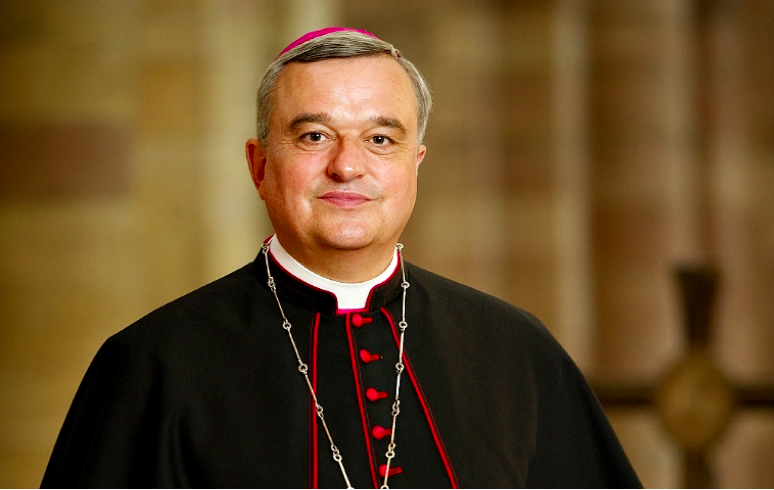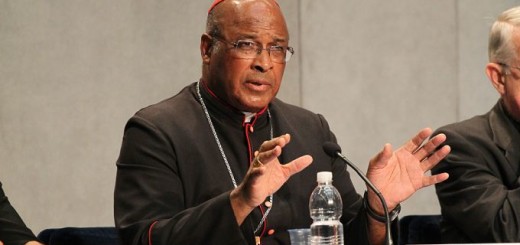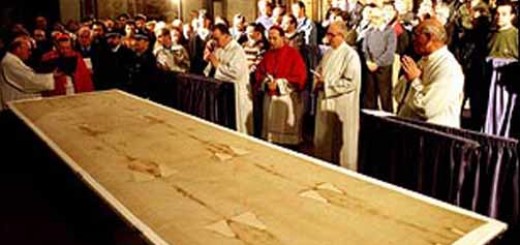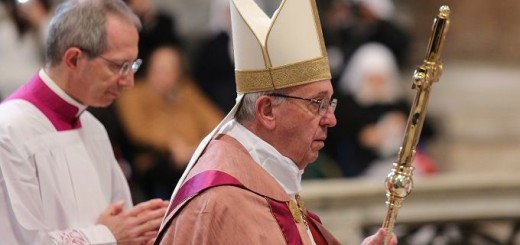German bishops plan Guidelines for divorced, remarried

Christa Pongratz-Lippitt, in NCR, Dec. 21, 2016 (In the pic: Bishop Karl-Heinz Wiesemann)
 (Note: All are fully aware of the biblical dictum: “Those who stand and wait also serve!” But then how long is one to wait? Even Framcis lost his patience at the sight of the endless standing of guards at his door and so he brought a chair and asked the Swiz guard to sit, instead of standing. Jesus did not go on endlessly writing in the sand but told the woman caught in adultery: “I too don’t condemn you. Go sin no more.”
(Note: All are fully aware of the biblical dictum: “Those who stand and wait also serve!” But then how long is one to wait? Even Framcis lost his patience at the sight of the endless standing of guards at his door and so he brought a chair and asked the Swiz guard to sit, instead of standing. Jesus did not go on endlessly writing in the sand but told the woman caught in adultery: “I too don’t condemn you. Go sin no more.”
Now it is months since Amoris Laetitia gave a fitting conclusion to the two Family synods. If it was an expression of God’s mercy, it is ridiculous to make the repentant Sinner wait endlessly. That must have been the logic which prompted German bishops to get on with the business of giving communion to the contrite remarried.
The four German cardinals who wrote to Francis seem to be birds of the same feather of Cardinal Burke and team of USA who wanted to trap Francis into saying something heretical. Sin and heresy are all creation of Church men, not of God. He has given enough light to every individual to see what is right and wrong, which is called Conscience which ought to be the ultimate guide for humans in all moral conduct. Problems are created by church men who want to force themselves as the conscience of others.
The greatest Wonder of creation is that there are no two persons alike in the universe and so trying to fit individuals into a man-made universal law will be like fixing a square peg into a round hole. Francis had even said more than once that more than half catholic marriages not valid for lack of proper understanding on the part of young couples.
Also one has to remember communion is not a reward for the just but a medicine for those sick with sin and Jesus came for sinners not for the just. These and many other arguments easily justify encouraging the divorced and remarried to receive communion. james kottoor, editor)
While bishops in two German dioceses have announced guidelines instructing priests to allow some divorced and remarried Catholics to receive the sacraments, the Vatican's doctrinal chief has reiterated that the church's teaching on the indissolubility of sacramental marriage provides no exceptions.
Bishop Karl-Heinz Wiesemann of Speyer, Germany, announced in an interview Dec. 17 that he will publish guidelines on how priests in his diocese should accompany divorced and remarried Catholics who want to receive the sacraments. Wiesemann said that Pope Francis has made this possible in individual cases after appropriate accompaniment by a priest.
"In Amoris Laetitia" — the apostolic exhortation Francis issued in April responding to two Synods of Bishops that discussed family life and marriage — "the pope says that, without changing church doctrine, we must distinguish between the different circumstances people live in," Wiesemann told the German daily Mannheimer Morgen.
"We priests are not here to replace a person's conscience. Francis wants us to be spiritual companions and not lords over people's faith. We should accompany people and help them to find the right way based on their faith. Catholics should find their church helpful, Francis has underlined, and that is what I would like to contribute toward," Wiesemann said.
His interviewer pointed out that four cardinals, including the former archbishop of Cologne, Cardinal Joachim Meisner, had asked the pope in an open letter for clarification on the issue of Communion for divorced and remarried Catholics. Should this be seen as a protest on the part of conservative circles in the church?
"The letter is a query regarding the interpretation of an exhortation," Wiesemann replied. "The pope has replied and pointed out that there are not only black-and-white answers. Francis is not invalidating church teaching but says we must consider each case individually and recall that the Eucharist is a remedy to uplift and strengthen people."
Francis "has opened up a way of reaching a decision in individual cases that will enable the divorced and remarried to receive the Eucharist after appropriate accompaniment by a priest, and we in our diocese are working on a handout on the issue," he said.
Speyer is the second German diocese to put into practice Amoris Laetitia, which is known in English as "The Joy of Love." In November, Archbishop Stephan Burger of Freiburg said that he thought enabling divorced and remarried Catholics to receive the sacraments was one of the core messages of Amoris Laetitia.
"It is not possible to find a clear and unambiguous solution for everyone and everything at hand, as life is too complicated," he said in an interview in the archdiocese's church paper, Konradsblatt. Francis had made it possible for divorced and remarried Catholics to receive Communion in individual cases after discussing their situation with a priest and having reached a decision of conscience, Burger said.
Since 2013, some priests in the Freiburg archdiocese have ministered to couples using a 14-page handout published by now-retired Archbishop Robert Zollitsch, on how to conduct a "pastorally and theologically profound discussion" with divorced and remarried Catholics with a view to allowing them to receive the sacraments.
Meanwhile, the prefect of the Vatican's Congregation for the Doctrine of the Faith, Cardinal Gerhard Müller, reiterated that there are no exceptions to the indissolubility of sacramental marriage as taught by the church.
The individual cases Francis spoke of in Amoris Laetitia "refer to whether all the natural prerequisites and the correct understanding of marriage were met when the marriage was contracted or not," Müller said in an interview with the German daily Passauer Neue Presse Dec. 16.
According to Müller, the individual cases the pope referred to were those cases where according to canon law it was unclear whether a valid sacramental first marriage had been contracted, "and where an individual person, after consulting his or her confessor, comes to the honest conviction that his or her first marriage is invalid." It is, however, quite clear that these individual cases "are not a door to a kind of 'Catholic divorce,'" he said.
[Christa Pongratz-Lippitt is the Austrian correspondent for the London-based weekly Catholic magazine The Tablet.]
















